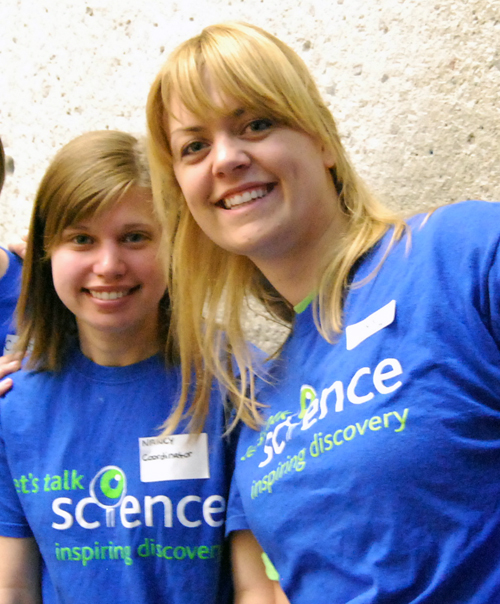By Anna Wassermann, Students Promoting Awareness of Research Knowledge

If you think kids are ambivalent about science, think again. An award-winning organization that runs a program at U of G called Let’s Talk Science is proving that children are excited about science. The program has become so popular that it can’t keep up with the demand for its teaching services.
Let’s Talk Science is a national, non-profit outreach organization that works with schools, camps and youth programs to deliver fun science-based activities free of charge to children from preschool to Grade 12.
Across the country, the outreach program is in high demand; the U of G program has a waiting list for teachers who want to bring it into their classrooms.
That list is matched only by the waiting list for volunteers who are eager to gain valuable teaching experience and networking opportunities. Started in 2008 with only five volunteers, U of G’s Let’s Talk Science program has doubled the number of its volunteers in the past year alone, growing to 150 students.
Nearly 80 per cent of these volunteers are graduate students, but third- and fourth-year undergraduate students – and even professors – are invited to volunteer.
“We’re trying to do away with the stereotype of the scientist with the white lab coat and crazy hair,” says U of G Let’s Talk Science co-ordinator Ann Vandergust. “Sending a 22-year-old into a classroom to say, ‘Hi, I’m an engineer,’ or ‘Hi, I’m a physicist’ blows stereotypes out of the water.”
The only thing standing between the program’s volunteers and the many children waiting for their services is limited funding. The program relies on donations to purchase activity supplies and pay for travel expenses for rural visits to places such as Fergus and Owen Sound.
The program offers more than 40 activity kits that complement the Ontario curriculum. Many of the kits are put together by Let’s Talk Science co-ordinators, using basic items such as those found at a dollar store.
The process of requesting a visit from Let’s Talk Science is simple. Teachers and community leaders can browse a list of available activities on the Let’s Talk Science blog and complete the online registration form.
The program is not just for schools anymore. Earlier this year, Let’s Talk Science engaged youth at the Arthur Fall Fair, the Meaford Public Library, U of G’s College Royal and the Interaction conference.
To bring children’s literacy and scientific knowledge together, the program recently launched three companion activities at the Guelph Public Library, featuring children’s books by Robert Munsch. The program gives children ages four to six the chance to perform hands-on science complementing his books: 50 Below Zero, Something Good and Angela’s Airplane.
Next spring, the University will be one of 23 locations hosting children in Grades 6 to 8 for the annual Let’s Talk Science Challenge.
The program aims to get children “hands-on, minds-on,” says U of G Let’s Talk Science co-ordinator Nancy Stonos.
“We just want to get kids excited about science, whether or not they pursue it in the future,” she says. “It’s about getting children engaged, excited to learn and developing those transferable analytical skills that are valuable in every aspect of life.”
Financial support for Let’s Talk Science at U of G is provided by the Let’s Talk Science National Office and U of G’s Office of Research, Office of the Vice-President Academic, and various colleges and departments.